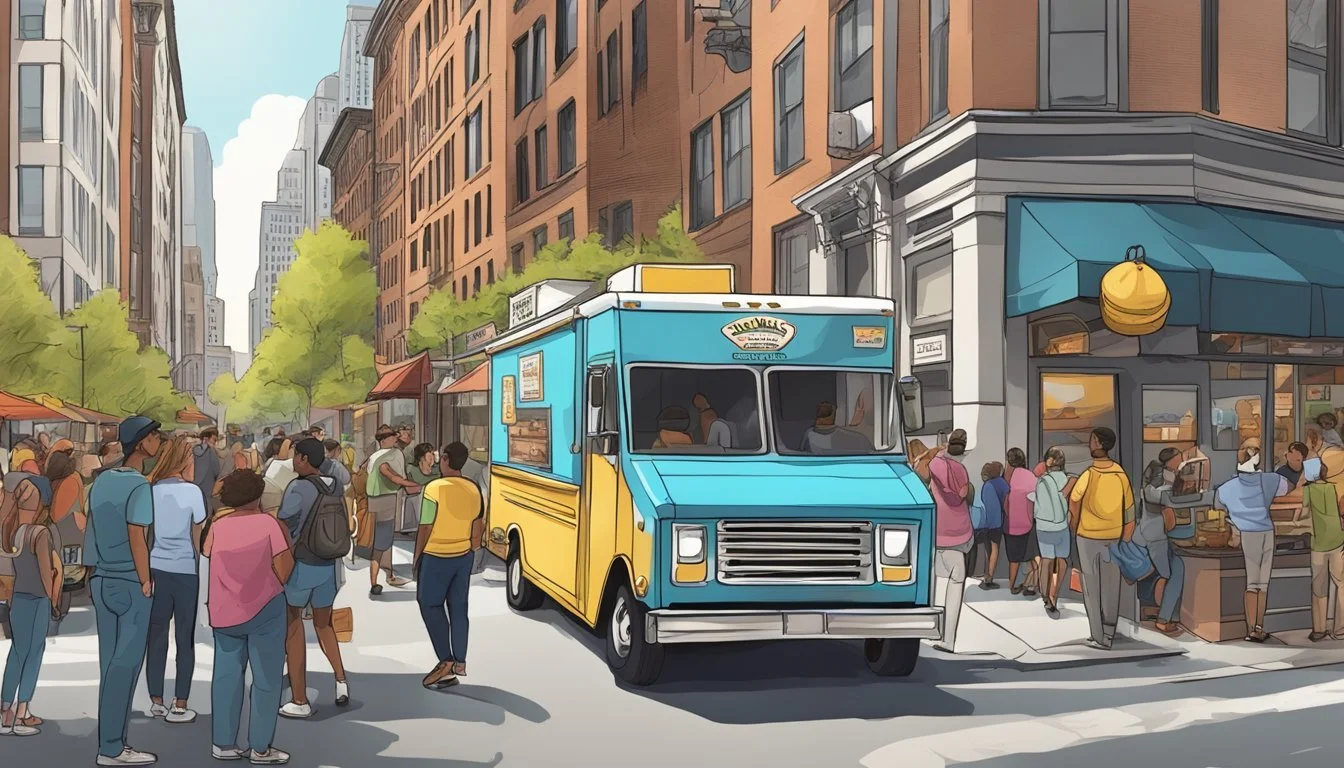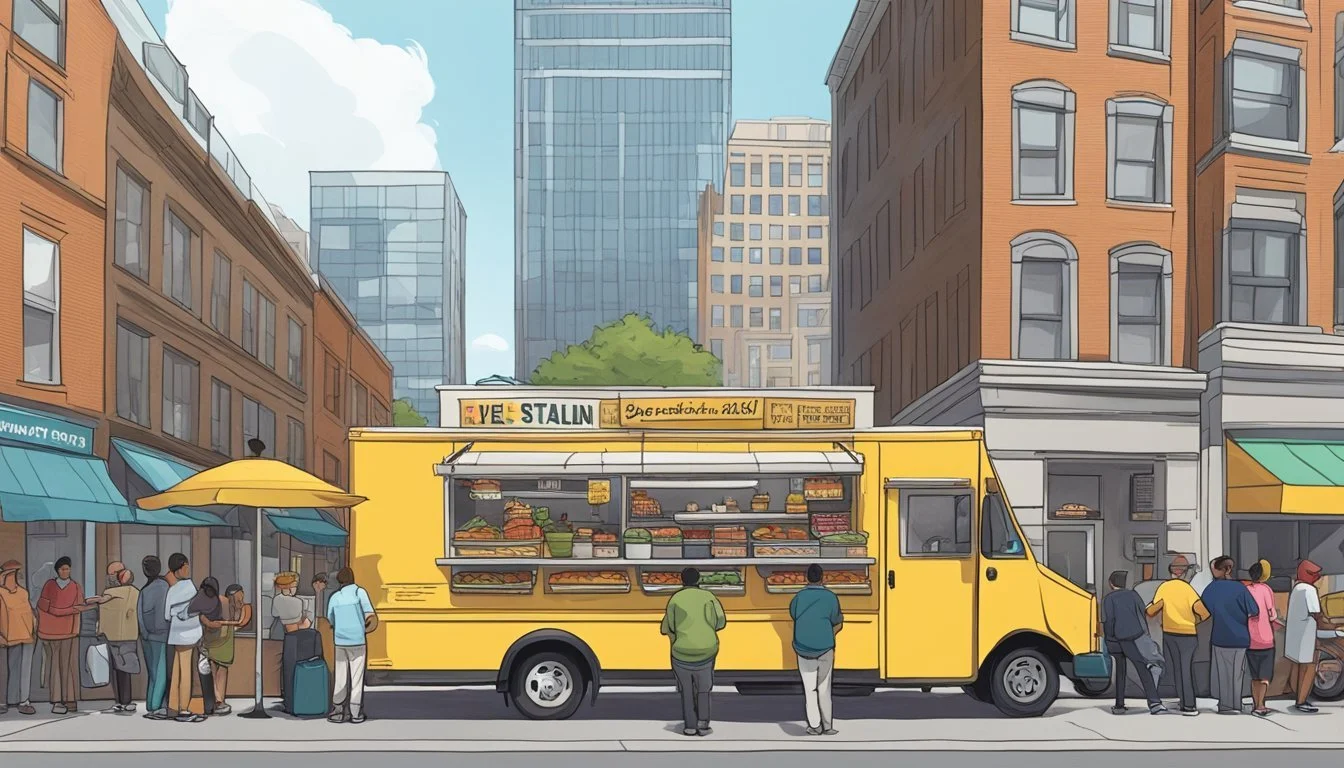Food Truck Laws Boston, Massachusetts
Navigating Regulations and Permits
Food truck culture in Boston has seen significant growth since its establishment in 2011. It has become a bustling part of the city's culinary scene, reflecting Boston's spirit of innovation and its commitment to economic development and opportunity. As the number of mobile eateries grows, navigating the web of regulations becomes crucial for entrepreneurs looking to serve the city's diverse populace. These vendors contribute to the local economy not only by providing an array of dining options but also by creating jobs and fostering community engagement at public and private sites throughout the city.
The City of Boston's officials have set clear rules and regulations for the operation of food trucks to maintain public health standards and ensure fair business practices. Compliance with these regulations is managed by the Office of Economic Opportunity and Inclusion, aligned with the city's goal of supporting small business development. The rules outline necessary steps for obtaining permits, participating in public site lotteries, and scheduling regular inspections.
Understanding and adhering to the legal requirements is vital for the success of any food truck business in Boston. Entrepreneurs must be proficient in the specifics of permit acquisition and knowledgeable about the varying types of vending allowed across the city. Insight into these legalities helps to ensure that food trucks can operate smoothly, contributing to Boston's vibrant street food scene while meeting the standards set by city authorities.
Regulatory Framework
The regulatory framework for operating food trucks in Boston, Massachusetts, involves a multifaceted permit application process and adherence to local health, safety, and operational regulations. Entrepreneurs must navigate these protocols to ensure compliance.
Permit Application Process
To start a mobile food enterprise, entrepreneurs must go through a detailed permit application process. The City of Boston's Inspectional Services Department is the primary regulatory authority overseeing the permits, which includes submission of a Food Truck Business Plan and an evaluation of proposed parking locations.
Local Health Regulations
Food trucks are required to comply with the Retail Food Code. The Local Board of Health mandates the sale of Non-TCS Foods to follow strict food safety protocols. Securement of a health permit is a pre-requisite.
Fire Safety Requirements
The Boston Fire Department outlines fire safety requirements for mobile food establishments. Compliance includes proper installation and maintenance of fire suppression equipment and periodic inspections.
Parking and Location
Parking and location are regulated to mitigate impact on traffic and maintain public safety. Mobile food trucks must obtain permission to operate on both public sites like Rose Kennedy Greenway and private sites with consent from the property owner.
Operating Permits and Fees
Operating a food truck requires several permits such as a health permit from the Inspectional Services Department. Entrepreneurs are subjected to various fees, including those for parking and site usage, which vary by location and size of the mobile food unit.
Business and Site Planning
Effective business and site planning is critical for success. This includes submitting a detailed food truck business plan and securing agreements for use of locations such as City Hall Plaza.
Events and Time Slots
Participation in special events and reservation of time slots can also be regulated. Operators often need to coordinate with the municipality and event organizers, conforming to specific requirements set for the duration and nature of the events.
Food Safety and Handling
Food truck operators in Boston, Massachusetts must adhere to strict guidelines for food safety and handling to prevent foodborne illness and ensure public health. These standards are closely tied to the operation's food safety plans, menu, ingredients handling, and employee training.
Temperature Control and Storage
Food trucks must maintain precise temperature control to prevent bacterial growth in food products. Cold food should be held at 41°F or below, while hot food should be maintained at 135°F or above. Essential equipment includes adequately calibrated thermometers to consistently monitor food temperatures, both in storage and during holding times. For mobile food establishments, ServSafe certification is often a guideline for best practices in temperature control.
Food Preparation Procedures
Preparation of ingredients must be handled meticulously to avoid cross-contamination. Chopping boards must be used for individual food types, and cooking and reheating practices must reach temperatures high enough to eliminate pathogens. The City of Boston mandates that a Certified Food Protection Manager oversees the preparation process, ensuring compliance with health regulations and safe food handling techniques.
Employee Health and Hygiene
A crucial aspect of food safety is ensuring that all food truck employees understand and practice proper handwashing techniques. This includes using soap and water for at least 20 seconds and drying hands with single-use towels. Food establishments in Boston are also expected to have policies in place for managing employees who may show signs of illness, to prevent any risk of transmitting diseases to consumers or other staff.
Supplies and Equipment
The proper selection and maintenance of supplies and equipment are vital to food safety in food truck operations. All water supply used in the food truck must meet health standards for sourcing and must be regularly tested. Equipment and utensils must be thoroughly sanitized, and single-use items, like chemically treated towelettes for customer hand cleaning, must be available when there's no access to a stationary handwashing facility. The food truck's servicing area—where supplies, perishables, and equipment are stored—must keep to health codes for cleanliness and safety.
Logistics and Operations
Managing a food truck in Boston requires careful navigation of various logistical and operational challenges that touch upon aspects like transport management, sanitation practices, and supply coordination. Effective operation within these parameters is pivotal for success.
Vehicle and Transportation Management
A food truck, deemed a Mobile Food Establishment, necessitates compliance with Massachusetts’ state regulations for transportation and vehicle management. Each vehicle should be properly secured when not in operation and meet all safety standards for transit. Trucks must have an approved source for their power needs and ensure safe driving practices during transportation to different locations.
Waste Disposal and Sanitation
Waste disposal and sanitation are critical for maintaining a** food service's integrity and reputation**. Properly marked waste receptacles should be used, and all waste must be disposed of at an approved facility. Regular cleaning and sanitation actions must be documented and adhere to the Retail Food Code Standards for Mobile Food Establishments.
Daily Operation and Maintenance
The scope of daily operations extends beyond serving food. It involves routine checks of equipment and inventory to protect against foodborne illnesses. Meat, fish, and other perishable items must be stored at the correct temperatures and protected from contamination. Furthermore, consistent maintenance of the vehicle’s cleanliness is non-negotiable to uphold health standards.
Supply and Ingredient Management
Responsible ingredient management is crucial for food truck operations. All supplies must come from an approved source; particularly, high-risk items like meat and fish require vigilant sourcing and handling. Inventory should be regularly reviewed to secure fresh provisions and prevent running out of stock during hours of operation.
By adhering to these guidelines, food truck owners in Boston can ensure a smooth operation that aligns with local laws and sustains high service quality.
Additional Considerations
When undertaking the venture of operating a food truck in Boston, Massachusetts, entrepreneurs need to pay close attention to more than just the legal requirements. Key to the success of their mobile food establishment are a robust marketing strategy, a deep understanding of their customer base, and savvy navigation of the entrepreneurial landscape.
Developing a Marketing Strategy
A strategic approach to marketing is essential for a food truck’s visibility and growth. Entrepreneurs must identify the most effective channels to reach their audience, whether through social media, local events, or partnerships. It is crucial to create a brand identity that resonates with the target demographic and distinguishes the food truck from competitors in Massachusetts' bustling food scene.
Understanding the Customer Base
Knowing the customer base involves more than recognizing what they enjoy eating and drinking. Food truck owners should analyze customer behaviors, preferences, and spending habits to tailor their menu and service. Engaging with the community and soliciting feedback can drive menu development and help establish the food truck as a staple in local economic development.
Navigating the Entrepreneurial Landscape
Food truck operators in Massachusetts must adeptly manoeuvre through the challenges of entrepreneurship. This includes developing a thorough business plan that covers financial projections, operational strategies, and contingency plans. Additionally, navigating city-specific legislation and staying informed on changes that could affect mobile food establishments is paramount. Entrepreneurs should seek resources and support from Boston's economic opportunity and inclusion initiatives to ensure sustainable business development.





